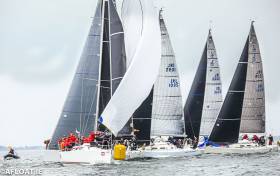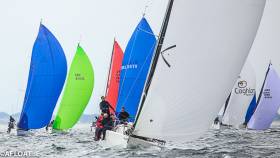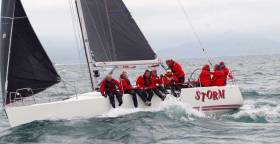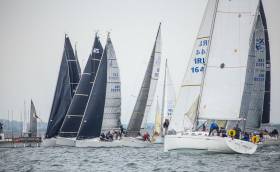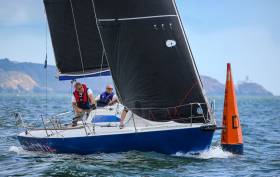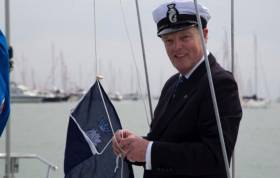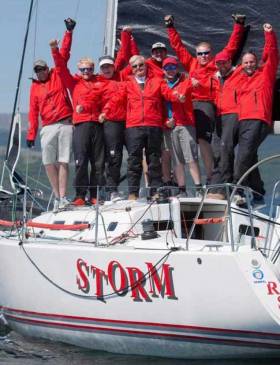Displaying items by tag: ICRA
All Four Provinces Heading for ICRA National Championships at Royal St George Yacht Club
With four days to go on discounted early entries to the ICRA National Championships, a strong fleet representing fifteen clubs and all four provinces have already entered the June Championships at the Royal St. George Yacht Club on Dublin Bay.
Stepping out of a committee meeting finalising the social programme (pictured above) Event Chairman Ian Simington commented "We are really encouraged to see early entries from crews in Ulster, Connacht and Munster.
A large travelling contingent makes racing more exciting and the social more lively. We are planning a social and catering programme that will provide for all sailors and really looking forward to a great event. With the first U-25 crews of an emerging class entered we expect them to add to the atmosphere on and off the water".
The ICRA National Championships will be staged from 7th – 9th June.
2019 ICRA Nationals Racing Programme Announced for Royal St. George Yacht Club Championships
The three-day ICRA Championships being held in Dun Laoghaire from June 7 will comprise of four fleets accommodating offshore, traditional and white sail racing. Each fleet will get its own race areas with race management lead by International PRO David Lovegrove.
Back on shore, there will be a lively social programme, the renowned Royal St. George Yacht Club welcome and hospitality for all.
‘’The Royal St. George Yacht Club is delighted to be hosting the ICRA National Championships and Corinthian Cups and to welcome sailors from around the island of Ireland and internationally. Together with ICRA and a large team of Royal St. George Yacht Club volunteers, we look forward to creating an environment for enjoyable and competitive racing for these prestigious Championships, said event Chairman Ian Simmington.
"ICRA and RStGYC have worked hard to create a format of World Class racing that sailors want"
ICRA and the Royal St. George Yacht Club have worked hard to create a format of World Class racing that sailors want. We believe in particular, that the addition of the offshore/coastal series for class 0 and 1 and the creation of 2 non-spinnaker classes will provide suitable racing for all classes of boat and crew preference, he added.
There is an increased focus on U25 crews with an U25 prize category, as well as prizes for all female crews.
To achieve this, there may be four fleets and race courses as outlined below:
- Cruiser Division 0 and Division 1 (offshore): Fleet 0
- Cruiser Divisions 1 and 2: Fleet 1
- Cruiser Divisions 3 and 4: Fleet 2
- Cruiser Division 5, Non-Spinnaker 1 and 2: Fleet 3
The new Entry Fee structure as follows:
Entry Before 15 March: - Boats rating 0.895 and under: €165 - Boats rating between 0.896 and 0.985: €195 - Boats rating 0.986 and above: €225
- Under 25 Crews: Complementary. After 15 March: - All boats: €245
Notice of Race and online entry are now available on the event website here with early entry discount available for entries received online by March 15th.
With the Dun Laoghaire to Dingle race taking place the following week (12th June), there will be a limited number of complimentary visitor berths available from Sunday 9th of June for yachts competing in both events.
“It's been truly impressive to see the Royal St George event management team kick into action. The 2019 ICRA National Championships are certainly going to benefit from the Club’s experience running major international regattas over the last few years. It's great to see the level of co-operation there is between the Dublin clubs and in particular, we'd like to thank DBSC for making space in their traditional calendar for us. As well as top class racing, we're putting a lot of focus on the social side, making sure that everyone is well fed and watered as soon as they come ashore and have a chance to relive the day’s events into the evening. We have some great prizes lined up care of North Sails, UK Sails, Rope Dock, Racegeek, Dubarry of Ireland and Viking Marine. Everything is set for an event to remember, " said Ric Morris, ICRA Technical Delegate
Richard Colwell – Steady Hand & Visionary Outlook on ICRA’s Helm in Period of Change
When time is spent with Richard Colwell, who was elected as the new Commodore of the Irish Cruiser Racing Association in November, you’re quickly reminded of the saying: “If you want anything done, and done well, then ask a busy man to do it” writes W M Nixon.
For although he has been well known for at least a dozen years in top-level cruiser-racer competition in Ireland, he is much more widely known in public as the founder and CEO of RED C, the leading opinion polling and market research organization.
There is of course much more to RED C than those two pillars of activity. And in addition to a high profile in Ireland, it has an international presence thanks to its founder’s boundless energy, total enthusiasm, networking skills, and apparently endless capacity to make hard work seem relatively effortless.
But we’ll return to all that in due course. Initially, our interest lies in the fact that here he is – an affable Londoner born and bred – living very much at home in the heart of the distinctly eccentric maritime community of Howth. That would be quite enough for many people. But he also plays a leading role in local and national cruiser-racing, and is now the top honcho with its national organisation at a time when it can reasonably claim to be the branch of specialized sailing which has the greatest number of active adherents in the country. And all that in addition to a day job which, in modern multi-communication style, is essentially a 24/7 activity.
“If you want anything done, and done well, then ask a busy man to do it”
He learned his own sailing in sheltered waters very different from the rugged seas that are sometimes instantly encountered in sailing out through the mouth of Howth Harbour. His father was an editor at the noted London publishers Jonathan Cape, with one of his main responsibilities in looking after the firm’s perennially best-selling children’s books by Arthur Ransome, and that in turn led to early sailing on gentle waters.
As anyone who was reared in an Arthur Ransome household will know, sailing was often the pre-eminent activity in a series of very believable stories with which the young (and sometimes not-so-young) readers readily identified. Colwell Senior not only loved the books himself, but made a point of taking his family on holiday to the many interesting places where Ransome located his young sailors, such as England’s Lake District, the Norfolk Broads and the muddy but utterly fascinating creeks of the Suffolk and Essex coasts of the Thames Estuary.
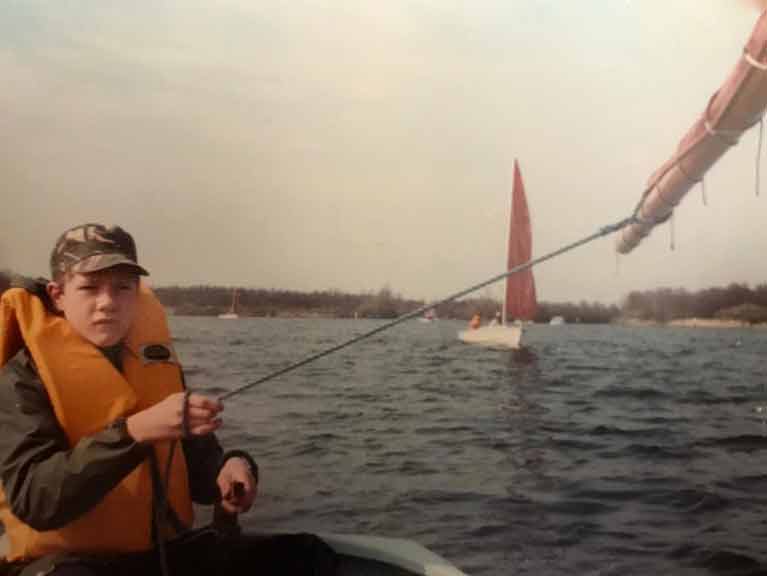 Early days. A young Richard Colwell learns his sailing on the sheltered waters of the Norfolk Broads
Early days. A young Richard Colwell learns his sailing on the sheltered waters of the Norfolk Broads
The Norfolk Broads are a sailing nursery, and though for reasons of family comfort the Colwells would sometimes hire a motor-cruiser rather than one of the characterful Norfolk Broads sailing charter craft, always there would be a dinghy in tow with some sort of sail rigged on it, giving young Richard his first taste of sailing.
But it was at school that his interest in it was most positively encouraged, as he went to a forward-looking secondary school which was keen to promote sailing, and at weekends sent a training group to Datchet Water where the now teen-aged Richard Colwell cut his competitive sailing teeth in Mirrors and Enterprises.
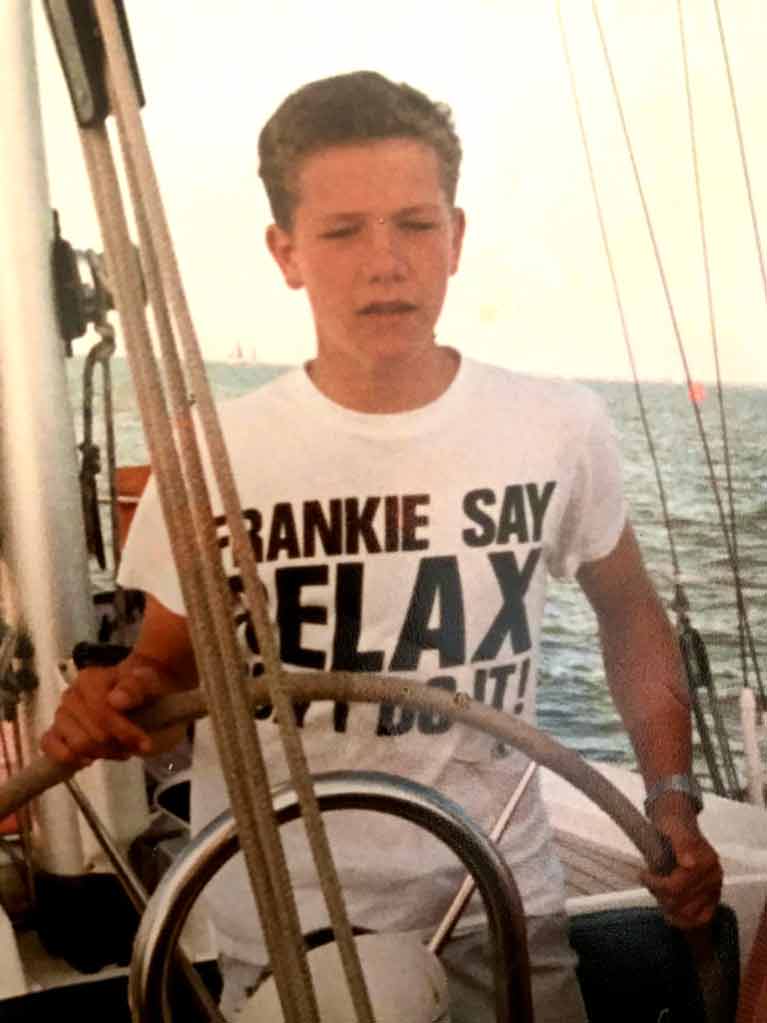 The man in charge – and a thought for the day on his T Shirt. Richard aged 15 in command of the watch, on an Oyster 54 ketch crossing the North Sea to the Friesian Islands.
The man in charge – and a thought for the day on his T Shirt. Richard aged 15 in command of the watch, on an Oyster 54 ketch crossing the North Sea to the Friesian Islands.
This strengthened friendships with other young sailors whose parents had cruisers and cruiser-racers on England’s East Coast, with the River Orwell - broadening below Ipswich on its way to the sea - becoming another focus of attention, providing cruiser-racing in boats around the 30ft mark, and several cruises in an Oyster 54 ketch. These included a well-remembered North Sea crossing to the Friesian Islands in an Oyster 54. Young Richard was just 15, yet the owner had sufficient confidence in his youthful crewman to leave him in charge for a night watch in a busy shipping area.
With approaching adulthood, working in London was increasingly his life-focus, and he found career fulfilment in the specialised arts of market research and public opinion polling. By this time, his main participation sport would have been rugby – he is still very much an avid supporter, though now of Ireland. But a bit of London remains in enthusiastic inherited support of Tottenham Hotspur, which he has backed through thick and thin towards today’s encouraging improvement.
However, the life-changing experience of those special London years was meeting Julie Wallace, who was working in the metropolis but came from a place he’d never heard of in Ireland called Howth, though he was well aware of Dublin. But as Julie came from a leading Howth sailing family – her father Vincent had been a Trinity College and dinghy sailor, and a successful campaigner of a Ron Holland Shamrock and a First 30 – visits to the new girlfriend’s family introduced him to a way of life which was not only lived in a hilly place, but had the sea at its most vigorous with a very active sailing club virtually within walking distance of home.
 Richard and Julie – she brought him home to Howth.
Richard and Julie – she brought him home to Howth.
In other words, it was a sailing scene about as different a possible from that in which he grew up. But increasingly regular visits to Howth, sailing with his now father-in-law on his Moody 40 Medimode in both the Irish Sea and later from a Malta base, drew him into the Howth scene, and after early married life in London, with their eldest child Ben now two years old, Julie enticed him back to Howth, and he has felt very much at home here in the twenty years since.
Arriving with his high-level London experience, he worked initially in Dublin with the established firm Lansdowne Research, but in 2003 he spread his solo wings by setting up RED C Research. It’s an eminently memorable name for which interested folk have provided any amount of interpretations, but Richard says it is simply the anagram of Research, Evaluation, Direction and Clarity.
Whatever, as it’s at the cutting edge of social psychology it provides endless scope for good or evil, but in the benign and useful form which RED C pursues, there is of course much more to it than the raised-profile public opinion polls which every so often hit the headlines, particularly if they’ve gone slightly off target. For there are also other extensive areas of advanced research which it does away from the public eye, projects whose ultimate result is for the general good, but inevitably there is not much sensational news in that area, even if some of us find it fascinating.
Certainly, it would be something which many less well-organized people might find so absorbing and time-consuming as to exclude almost everything else. But Richard Colwell is one of the best-organised people I’ve ever met, and with his sunny disposition, attractive intelligence, and remarkable ability to delegate, at the time he was setting RED C firmly on the road, he was also becoming increasingly active in Irish cruiser-racing. This was despite the fact that his work interests were taking on a more international aspect, for not only has he been Chairman for three years of AIMRO, the body that represents the market research industry in Ireland, but he is Irish representative on ESOMAR, the industry’s all-Europe organization, and is Vice President of WIN, a global network of research companies.
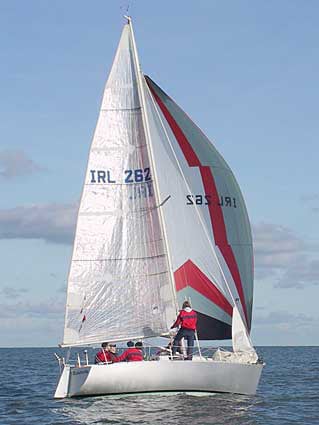 The first steps in cruiser-racer partnership were taken with the attractive and successful Albin Express Relativity, whose name is explained by the fact that Richard Colwell co-owner her in partnership with his sister-in-la Suzie and her husband Johnny Murphy
The first steps in cruiser-racer partnership were taken with the attractive and successful Albin Express Relativity, whose name is explained by the fact that Richard Colwell co-owner her in partnership with his sister-in-la Suzie and her husband Johnny Murphy
Though he’s interested in all sailing, it is the many aspects and subtleties of cruiser-racing which particularly appeal to him. He likes its ability to provide roles for people of many and varied abilities, he likes its capacity to create a team of whatever size the boat requires - a team of a unique structure which is both a democracy and yet a sort of benign autocracy at the same time - and he is utterly fascinated by the challenges of taking what is in effect a floating caravan – albeit an extremely austere caravan in many cases - and optimizing its capacity to be a sea-going racing machine, both in terms of making the best of the rig and the boat itself, and in squeezing the last possible benefit out of the rating process.
Then too, he admits that he finds nothing so adrenalin-including as working in towards the start line in a fleet of as many as forty or even more boats of varied types and speed, and somehow emerging from that melee in a good position with the continuous challenge of racing under sail, with all its attendant strategy and tactics evaluation in an endless all-involving process right to the finish.
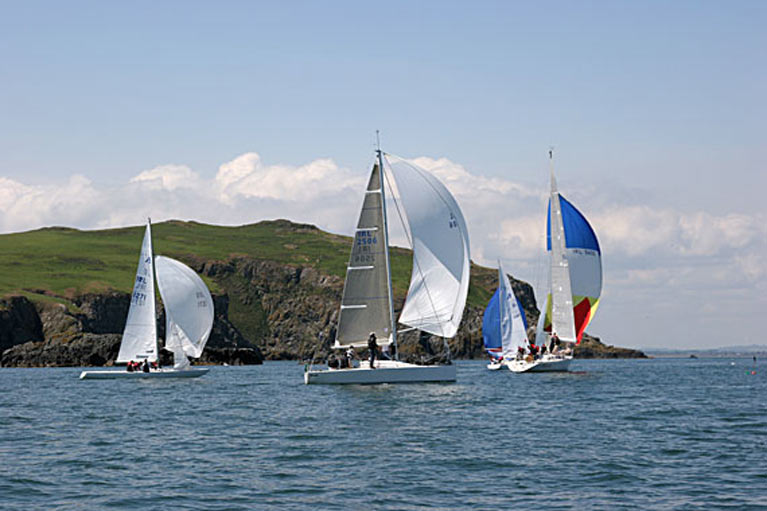 Local challenge – the Corby 25 Kinetic (centre) in the annual Lambay Race from Howth.
Local challenge – the Corby 25 Kinetic (centre) in the annual Lambay Race from Howth.
Unless it was sport, it would be very hard work indeed, yet although he had the demanding work of getting RED C up and running, he was already sailing in Howth with the likes of Kieran Jameson and Colm Bermingham, and then he was encouraged by his father-in-law Vincent Wallace into a cruiser-racer partnership with Vincent’s other sailing daughter Suzie and her husband Johnny Murphy of the renowned sailing family originally from Dunmore East, and in Howth they based and very actively campaigned the attractive Albin Express Relativity with considerable success.
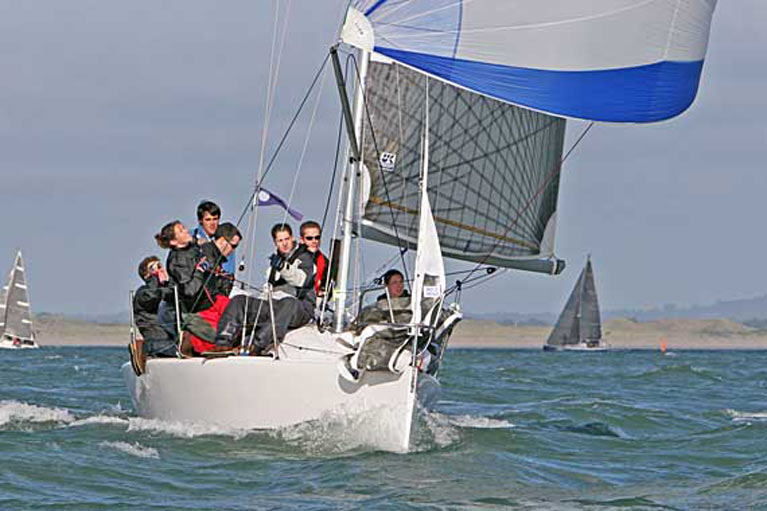 Kinetic in the Autumn League at Howth – she was always in the frame
Kinetic in the Autumn League at Howth – she was always in the frame
Then he and Johnny went for what was the sharp end - the extremely sharp end - with the Corby 25 Kinetic. John Corby’s skinny boat concept never seems more off-the-wall than in his 25-footers, yet Kinetic ticked all the boxes in being an IRC-rated boat in a hot class which provided all sorts of club racing, regional regattas, and national competition potential, and she was very much a force to be reckoned with, frequently in the frame and often at the top of it, during the intensive six years when Richard, Suzie and Johnny campaigned her.
Their sailing had become so intense that a break from competition seemed a good idea, but within a short time Richard found himself sailing again, this time as crew with Ronan Cobbe on his Mumm 24. However, the boat was simply too small, so the two of them formed a new partnership which became the Fusion team on another Corby 25, and the Colwell involvement with Irish cruiser-racing was ratcheted up still further.
His increasingly high profile and national enthusiasm had already been noted, with Howth Yacht Club Commodore Peter McKenna asking him to be an HYC representative on the Irish Cruiser-Racer Association Committee. With ICRA having a history of Commodores of the calibre of Jim Donegan, Fintan Cairns, Barry Rose and Nobby Reilly with the dedicated Denis Kiely doing the number-crunching, the Colwell role was initially advisory with market research services as the 2002-founded organisation grappled with the challenges of providing an annual National Championship for a fleet which by its very nature was inevitably diverse, while at the same time resolving between the demands of different sailing centres each of which felt – quite understandably – that every so often it was their turn by right to host that National Championship.
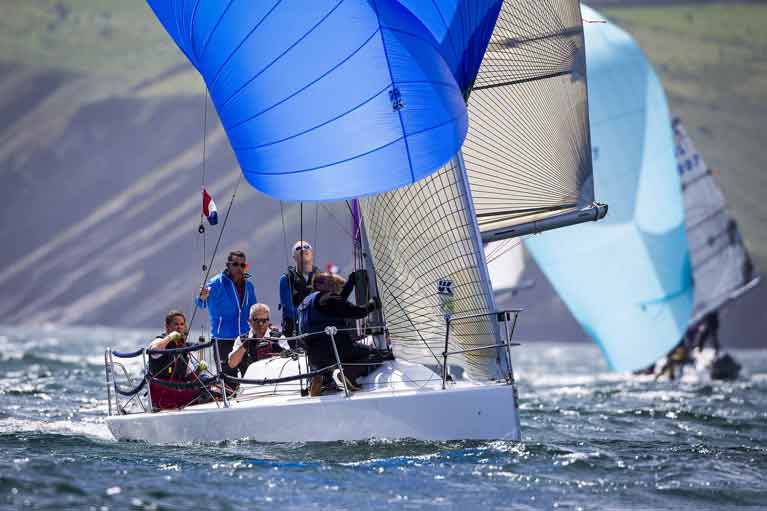 The new Corby 25 Fusion doing interesting things with her spinnaker in the Sovereigns Cup at Kinsale. Despite the experiments, she won this race. The boat may be only 25ft, but on board are (left to right) Suzanne Burke, Niamh McDonald, Ronan Cobbe, Richard Colwell, Craig Jeffares, Oisinn O’Donovan, and Ben Colwell Photo: ICRA
The new Corby 25 Fusion doing interesting things with her spinnaker in the Sovereigns Cup at Kinsale. Despite the experiments, she won this race. The boat may be only 25ft, but on board are (left to right) Suzanne Burke, Niamh McDonald, Ronan Cobbe, Richard Colwell, Craig Jeffares, Oisinn O’Donovan, and Ben Colwell Photo: ICRA
Until 2014, there was also the biennial task of co-ordinating Commodore’s Cup involvement. But like the Admiral’s Cup before it, the Commodore’s Cup has shrunk in appeal for Irish owners and skippers through expense, a process accelerated by the economic recession. Yet despite that, cruiser-racer numbers continued to increase at home, and under the Commodoreship of Nobby Reilly and his predecessors, ICRA secured the income previously going to the Irish Sailing Association which accrued from providing rating certificates, thereby achieving a stronger organizational base and a role with a higher profile. Yet although as the national authority Irish Sailing was professionally staffed, ICRA has continued to have its own ethos with an entirely voluntary administration, and personal enthusiasms and dedication closely affect the Association’s progress.
Thus the higher profile led to increased demands from growing fleets - particularly along the West Coast – for National Championship hosting rights, and with the Commodoreship now undertaken by the hyper-keen Simon McGibney of Foynes Yacht Club, it was arranged that the ICRA Nationals be staged at Galway, and the date set was mid-August 2018.
The organisers at Galway Bay SC put heart and soul into preparing for an event which would be staged from Galway Docks which inevitably involved the fleet transitting a sea lock for each day’s racing. It’s a schedule which has worked in times past for those accustomed to the Galway setup in the WIORA Championship, but for a fleet including visitors from larger sailing centres where easy 24-hour berthing access was taken for granted, it seemed potentially problematic. And when the weather went to pot, with such a succession of strong to gale force winds from the west that in the end no racing was held at all, the very future of ICRA as a viable body seemed to be at stake.
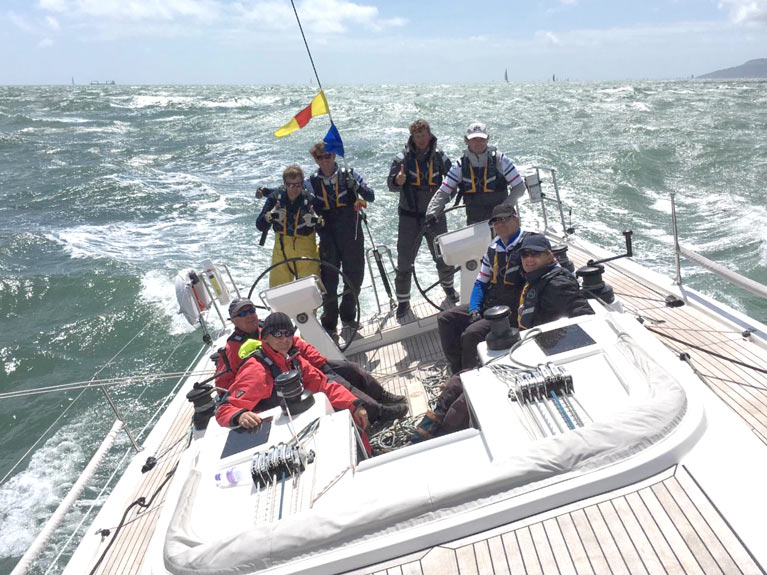 While they kept their focus on Ireland, the crew of Kinetic would occasionally give themselves a change of scene and boat size – this is racing the XP44 Simples in the Round the Island Race. Photo: Richard Colwell
While they kept their focus on Ireland, the crew of Kinetic would occasionally give themselves a change of scene and boat size – this is racing the XP44 Simples in the Round the Island Race. Photo: Richard Colwell
Even beforehand, there’d been many who said that the logistics of getting to Galway were too demanding at a time of the year when most east and south coast sailors were expecting quality holiday time with their families. But nevertheless for anyone with a small trailerable boat it was all very do-able, and Richard Colwell and Ronan Cobbe had been in the midst of the frustrated fleet in Galway Docks with Fusion, enthusiastic as ever and keen to race.
But with the doubts expressed beforehand, Richard had also been asked to do a survey of where the majority of ICRA sailors preferred to have the championship, and this was backed up by a study undertaken by fellow ICRA Committee Member Ric Morris.
Basically, the answer was: “Follow the numbers”. While everyone acknowledged the laudable idealism of rotating the championship around the country, the harsh reality was that most members reckoned the best path was to accept that, for the foreseeable future, the preferred locations are Kinsale, Crosshaven, Dun Laoghaire and Howth.
But even as that was being acknowledged, further balm was being provided for a decidedly bruised organization with the Royal St George Yacht Club in Dun Laoghaire stepping up to the plate in September with an agreement to stage the next ICRA Nationals in June 2019. And with the acceptance that for the foreseeable future the path for ICRA is going to be what the market hopes for, rather than what all-Ireland idealists might aspire to, the re-birth at the Dun Laoghaire venue from 7th to 9th June is now further supported by the recent welcome news that Dublin Bay Sailing Club has cancelled their racing on Saturday June 8th, thereby greatly increasing the appeal of participation in the Nationals.
Looking beyond this year, the ICRA Nationals 2020 will be part of Volvo Cork Week which is going to be one very busy regatta, but then Tricentenaries of the world’s oldest yacht club don’t come round every year.
Beyond that again, while numbers on the east coast may comfortably support a stand-alone ICRA Nationals, the south coast venues have to take account of the fact that they lack the personnel numbers that the Dublin monster provides, thus when ICRA is scheduled for Kinsale, it will be integrated with the Sovereigns Cup series. But on the east coast it will be kept separate from the enormous fun-oriented Volvo Dun Laoghaire Regatta and the new-style Wave Regatta at Howth, as both involve many non-cruiser-racer classes which would make it very problematic to stage a clearcut ICRA Nationals in tandem with the main event.
So for ICRA under Richard Colwell’s leadership, it’s going to be a case of sticking to the knitting, and doing what they do best, which is catering for the specific needs of Ireland’s keenly-campaigned cruiser-racers, needs which extend far beyond the provision of a high-profile recognised National Championship.
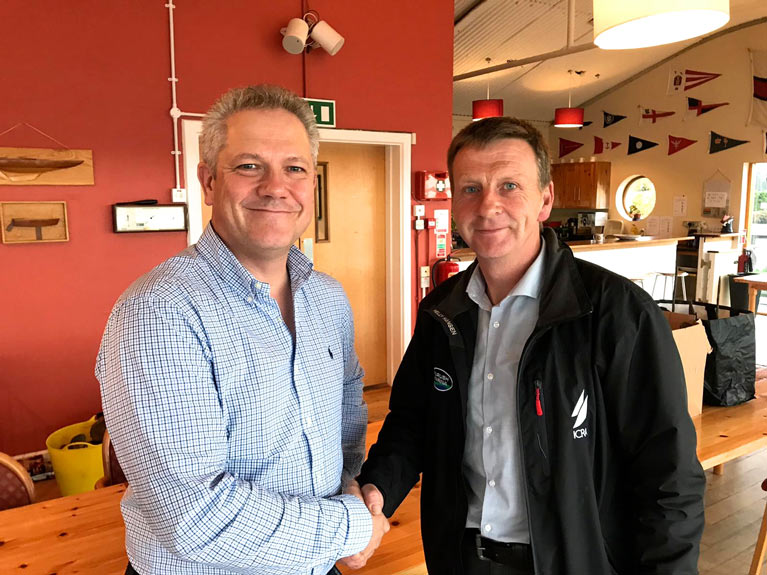 Richard Colwell takes over from Simon McGibney of Foynes YC as ICRA Commdore at Lough Derg YC in November 2018. Simon has continued as a member of the ICRA Committee
Richard Colwell takes over from Simon McGibney of Foynes YC as ICRA Commdore at Lough Derg YC in November 2018. Simon has continued as a member of the ICRA Committee
He took over the Commodoreship from Simon McGibney at a Special General Meeting in Lough Derg Yacht Club last November, and behind-the-scenes work since then resulted in a new-look ICRA Committee meeting formally for the first time on January 16th. Afloat.ie has already reported on the immediate outcome of that, but Richard’s own mission as Commodore puts it clearly with his four main themes developing:
“1.Deliver a first class National Championship event - to ensure that this is an enjoyable national championships recognised as the pinnacle of competitive yacht racing in Ireland. To ensure that ICRA run the best events moving forward, the committee have worked very hard on creating a set of general rules and regulations under which events should be held. These will underpin all future events and ensure members can be assured that their views have been taken into account. All of the major decisions were taken after consultation with members, and were finally agreed after a formal vote among committee members that represent clubs around the country.
2. We have also developed a New Boat of The Year process, that will allows yachts to build up points across a number of nominated events that they participate in across the country. This will take the mystery out of who wins this coveted award each year, and make it very transparent.
3. In terms of maintaining yacht racing standards, we work hard to liaise with IRC, with specialists like Mark Mills and others attending most of our meeting and conferences. We have also moved to improve standards by including On-the-Water Judges and technical boat checks at the Nationals. One other area that we have identified as something we want to work hard on is the national use of the ECHO handicap system. Members have made clear that the system needs some fresh thinking, to ensure it works as it should and delivers great racing and the opportunity to win events for boats across the fleet. We would like to invest time and money into trying to deliver a better system for all, where ECHO handicaps can be transferred between events in different parts of the country, utilising a central online database. At the moment this is at the planning stage, but we hope this can be actioned when funding has been agreed.
4. Finally, we are working hard to support pathways and encourage cruiser racing to a wider audience. The sports needs more people sailing, and whatever we can do to encourage this is important. We have designated a committee member, Kieran O'Connell of Royal Cork YC, to have responsibility for training grants, and in particular our support of the Under 25's pathways. We are working on supporting clubs who don't have them to develop Under 25 teams, and ICRA will also support their training and event entry through a series of grants. Over and above this, we also have a range of general training grants available for clubs to access, that will provide support for training events in cruiser-racing across the country. Grants need to be applied for by the club, with forms available on the ICRA website, and we encourage clubs to take advantage of these”.
 Family tradition – Richard Colwell and his son Ben, who is now 22 and very much a part of the planned campaign for the newly-acquired J/109 Outrajeous
Family tradition – Richard Colwell and his son Ben, who is now 22 and very much a part of the planned campaign for the newly-acquired J/109 Outrajeous
In an intense and energetic community like Irish cruiser-racing, leadership by example is arguably the best way forward, and in this case, actively campaigning one’s own cruiser-racer is virtually a job requirement. In Richard Colwell’s case, it is given a special spin, as he has always owned his boats in partnership, and a high priority for family values and involvement is integral to his way of sailing.
Thus as he faces into his first season as Commodore, he is also in the midst of a fresh boat-owning project, as he has moved on from the successful linkup with Ronan Cobbe on the Corby 25 Fusion to re-join his brother-in-law Johnny Murphy in the new ownership of the recently-acquired and lightly-used J/109 Outrajeous.
His son Ben, now 22 and in process of graduating from Trinity College, is a very important part of the equation, as almost from the start his sailing interests have gravitated towards cruiser-racing. He did his standard childhood duty afloat with a year in Optimists but subsequently much preferred to sail two-handed dinghies, and as soon as he could play a real role in his father’s current cruiser-racer, he took that route and provided the overall crew panel with access to rising star helms and other young specialists on the dinghy scene.
He also acquired deep sea experience, the most recent being a voyage to northwest Spain in grandfather Vincent Wallace’s Sun Odyssey 43 Poimandres with salty senior crewmates Kieran Jameson and Aidan MacManus (the latter providing the bonus of superb onboard cuisine). So young Ben approaches the season with a solid background in most aspects of sailing, and the proposed programme for Outrajeous well reflects the kind of competition that a dyed-in-the-wool ICRA enthusiast would expect.
It will start with training weekends and the Spring Warmers at Howth, and continue with the J/109 East Coast Championship followed by the Lambay Regatta, then continue on through the ICRA Nationals from June 7th to 9th, with the Volvo Dun Laoghaire to Dingle race just three days later, starting on Wednesday June 12th.
Then it’s halfway back to Howth again, with participation in the Sovereigns Cup at Kinsale from 26th to 29th June, before returning to the East Cast and re-grouping for the Volvo Dun Laoghaire Regatta from July 11th to 14th.
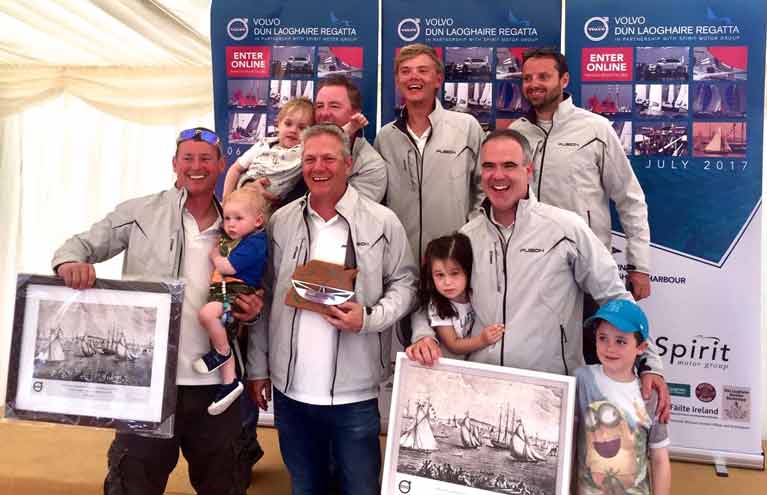 The joy of sailing with family and friends. The Fusion crew (with supporters) after a clean sweep at the Volvo Dun Laoghaire Regatta 2017 are (left to right) Ronan Cobbe, Hugo Cobbe, Rhys Cobbe, Richard Colwell, Oisin O’Donovan, Ben Colwell, Sophia Jeffares, Craig Jeffares, Peter Bayly and Christopher Jeffares. Photo: VDLR 2017
The joy of sailing with family and friends. The Fusion crew (with supporters) after a clean sweep at the Volvo Dun Laoghaire Regatta 2017 are (left to right) Ronan Cobbe, Hugo Cobbe, Rhys Cobbe, Richard Colwell, Oisin O’Donovan, Ben Colwell, Sophia Jeffares, Craig Jeffares, Peter Bayly and Christopher Jeffares. Photo: VDLR 2017
After that, the Colwell-Murphy combo have left it all clear until the Howth Autumn League and the J/109 Nationals, for although there’ll doubtless be events available among which some of the Outrajeous crew will happily pick and choose, as Andrew Algeo so sagely observed recently in his own reasons for trading down to a smaller boat less demanding of personnel, the reality of contemporary Irish life is that August is family holiday time.
While some boats solve that with Calves Week at Schull, for others it’s best not to commit to anything too ambitious. But whatever Outrajeous does during that more relaxed period, we can be quite sure that throughout the season Richard Colwell will be unobtrusively and carefully monitoring what works best for Irish cruiser-racer crews. He’ll be quietly moving the programme along in a way that reflects what works best, and what might be usefully possible, rather than forcing the pace for some unattainable and over-ambitious ideal. He’s someone who lives very much in the real world, and ultimately any idealism he has is of a beneficial and realistically attainable type.
New changes for the format of future ICRA championships are outlined by Irish Times Sailing Columnist David O'Brien with the news that the rule of pro–sailors will be removed given the growing number of 'quasi-pros' now involved in the cruiser-racer scene. ICRA also say the national championship event may in future be stand-alone or part of a bigger regatta depending on location.
Read more in the newspaper here.
The news follows ICRA's first meeting under new Commodore Richard Colwell.
In other ICRA news, the national body will shortly announce a new formula for selection of Boat of The Year which will be available to boats from all around the country based on combined regatta results
There will be a new initiative for pathways and funding for Under 25 teams and ICRA will be actively pushing for applicants to avail of its training grants.
ICRA Discusses Initiatives to Increase Participation in Cruiser Racing
The Irish Cruiser Racing Association (ICRA) held its first meeting of 2019 in Portlaoise on Wednesday, 16th January.
The Committee wasted no time in the new year to get together to finalise objectives for the year and discuss new initiatives to increase participation in cruiser racing nationally. New members of the Committee were welcomed by Commodore Richard Colwell, including Johanna Murphy, GISC, Liam Lynch, TBSC and David Cullen, HYC. Retiring members Colin Morehead, RCYC, Finbarr O’Regan, KYC and Rob McConnell, WSC, were thanked for all their help over the last number of years.
The Committee worked through a list of initiatives and activities that will be actioned during 2019 and beyond to support cruiser racing in Ireland. Commodore Richard Colwell commented “The ICRA Committee is dedicated to building and supporting yacht racing for all. It is our intention to put a renewed focus on training and development of younger sailors to encourage them into cruiser racing, to deliver to the needs of current cruiser racers and to improve communications and transparency to all our members. We intend to publicise several new initiatives in the coming weeks, and have put a great deal of effort already into drawing up strict criteria and guidelines to deliver the annual National Championships of the highest quality”.
The Irish Cruiser Racing Association (ICRA) has the job of bringing together the various aspects of Irish handicap racing in order to promote its interests. Since its inaugural meeting a decade ago, ICRA has built a solid core of interests among 7,000 cruiser racer enthusiasts and built one of the strongest sailing events in the country, attracting over 100 boats.
2019 IRC Welsh Nationals Set For 9-11 August
Save the dates 9 to 11 August 2019 in your calendar for the Spinlock IRC Welsh National Championships, which promises a long weekend packed full of great racing and fun ashore
Once again the Welsh Nationals have been selected as the Welsh leg of the RC35 class Celtic Cup, won in 2018 by Irish boat Storm.
The Welsh National Sailing Academy and Events Centre in Pwllheli looks forward to welcoming sailors from across the UK and Ireland for racing in the world-renowned waters of Cardigan Bay, with the majestic backdrop of the mountains of Snowdonia and the rugged coastline of the Llyn Peninsula.
The championships will feature two separate race courses, one for the IRC fleets and Sportsboat class and a separate course for the Cruiser class, so there will be something for everyone.
The Notice of Race and entry form are now available online. IRC certificates are not required at this time, only basic details and general information about your boat.
All entries made before Thursday 31 January will be included in a super early-bird prize draw with Spinlock goodies to be won.
Events pontoons will once again be available for use before and during the championship without any additional charges. Book your space now in the entry form.
Berthing will also be available for boats competing in the ISORA race from Dun Laoghaire to Pwllheli on Saturday 27 July for those who wish to leave their boat in Pwllheli ready off the IRC Championships.
This year the camping facilities at the academy will be available for participants. Bring your campervan or caravan to set up your base camp right on the venue site. More details and online booking can be found on the Plas Heli website.
There will also be a limited number of bunk beds available on on a first come, first served basis. Details about this added facility will be circulated to entered boats first.
Organisers will arrange shore storage so that your delivery sails, life-rafts and associated gear can be stored for the duration of the event. Please indicate on the entry form if you would like shore storage.
And of course, there will be a full social programme ashore. Details will be circulated by e-newsletter and published on the official championship website in due course.
'Engaged' ICRA Conference at Lough Derg Yacht Club Charts the Future for Cruiser Racing
An engaged group of 30 sailors or more gathered at Lough Derg Yacht Club on Saturday for ICRA's annual conference and agm that included a line up of talks as well as the presentation of the ICRA Boat of the Year Award, a sailors forum where discussion was heard about next year's national championships at the Royal St. George Yacht Club as well as ongoing refinements to ECHO handicaps. Below is a non-exhaustive overview of the day's proceedings under outgoing ICRA Commodore Simon McGibney.
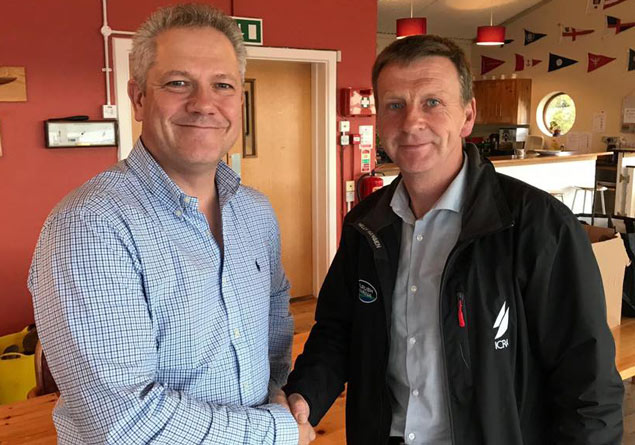 Richard Colwell, (left) of Howth Yacht Club was voted in as the new Commodore of Irish Cruiser Racing Association. He is pictured here without going Commodore Simon McGibney who retired after three years in he role. Photo: ICRA/Facebook
Richard Colwell, (left) of Howth Yacht Club was voted in as the new Commodore of Irish Cruiser Racing Association. He is pictured here without going Commodore Simon McGibney who retired after three years in he role. Photo: ICRA/Facebook
IRC & ICRA
Former RORC Commodore Michael Boyd, who was elected Chair of IRC Rating Congress last month, gave an excellent overview of where RORC is going. The London club is getting more involved with inshore thanks to the Royal Corinthian hook up and also working with ORC on the Worlds where a single Irish boat competed this year in The Hague. The combined World Championships was interesting and bought up a number of areas for further development. It remains unclear if IRC and ORC can ever merge but both are cooperating much better.
Boyd's overview presented IRC as an inclusive rule, with more emphasis on integrating different types of technology, versus the more traditional pure protection of the existing fleet.
Sails & Sailing
Prof O'Connell of North Sails Ireland gave an entertaining talk using highlights from the on the water sessions NS have done this year.
Graham Curran and Mark Mansfield of UK Sailmakers Ireland ran through some highlights from their Afloat.ie series this year (here), with a focus on setting up the boat and rig correctly.
Rory Carbery outlined the ongoing relationship between Irish Sailing and ICRA.
Strategic update
It was highlighted that the cruiser/racer fleet and the ICRA Nationals event contains a number of common designs. In future, ICRA to give these a focus and work with these owner groups to grow numbers and event attendance.
 The ICRA Nationals fleet features common designs including one designs such as J24s and 1720s Photo: Afloat.ie
The ICRA Nationals fleet features common designs including one designs such as J24s and 1720s Photo: Afloat.ie
Benchmarking against other class associations shows a number of areas where ICRA can improve: national series of events, technical support in terms of maintaining ECHO, common rules to help events run cruiser racing in compliance with the racing rules of sailing and that reflect the wishes of owners, better promotion of cruiser racing in Ireland
Howth Yacht Club's experience with under 25 sailors was highlighted as something that is working.
Pathways within cruiser racing ("how do ICRA create owners and keep them engaged") discussed. ICRA has initiatives for IS Training to Crew through the Under 25 effort and Competent Crew to Race Crew through the training grant. Other pathways for consideration include Friend Get Friend, Adult Training transition, engagement of Experience Seekers, Crew to Owner, White Sails to Spinnaker.
Under 25s update
There were six under 25 teams at this years J24 Nationals. Projects are going strong at HYC, RCYC and clubs in the west. At least one Dun Laoghaire club is looking to set up a team.
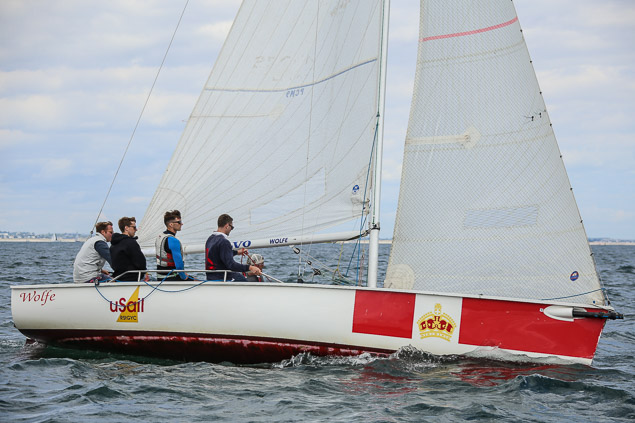 A Royal St. George Yacht Club 1720 sportsboat is used to introduce sailors to keelboat racing Photo: Afloat.ie
A Royal St. George Yacht Club 1720 sportsboat is used to introduce sailors to keelboat racing Photo: Afloat.ie
Confirmed ICRAs commitment to encourage the development of Under 25 racing through:
- Grants to help under 25 teams take part in national events
- Looking into the potential for an under 25s nationals
Training grants
Successful events run nationally but ICRA can do more. There is budget available, come and get it. Should ICRA increase the limit? ICRA open to proposals about €1000 on a case by case basis.
Should ICRA provide training to boats without an ECHO/IRC cert? Possibly but this funding is coming from cert fees so that contribution needs to be recognised in terms fo where funding goes.
Offshore
Nearly all boats above 1.040 now focusing on coastal and offshore. This is not seen as a threat to ICRA, more people doing the cruiser racing that is right for them and offshore meets many of ICRA's objectives. ICRA to continue to work in collaboration on developing all parts of cruiser racing as a whole.
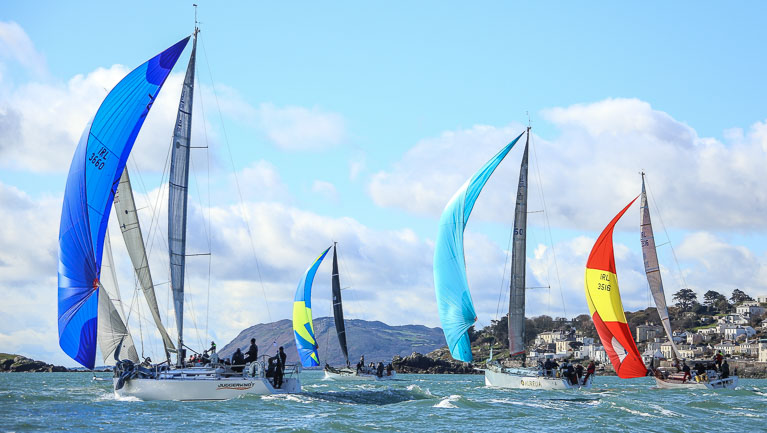 Offshore sailing, such as ISORA racing above, is an important part of the Irish cruiser-racing scene Photo: Afloat.ie
Offshore sailing, such as ISORA racing above, is an important part of the Irish cruiser-racing scene Photo: Afloat.ie
Sailors forum
Sailors forum at the ICRA conference covered a range of topics and the following suggestions/observations were made.
The Boat of the Year (BoTY) Trophy should be changed to a points series based on existing national and regional cruiser racing events.
BoTY points to translate into penalties on Standard ECHO, to help ECHO address the issue ICRA is having at major events with ECHO and IRC prizes going to the same boat. More work is needed by ICRA to improve support for ECHO at a local level.
To give people more confidence in terms of who they will be racing against when entering an event ICRA will adopt a range of classes based on the design of cruiser/racer commonly sailed and narrow rating bands. Divisions will be formed for an event by combining these classes. Overall prizes will be awarded for the division. Day prizes will be awarded for each class.
The makeup of racing at the nationals was discussed. Should ICRA move to all windward/leeward with a single longer race making better use of the fixed marks available at most venues? It was felt that ICRA should stick with the current mix of laid windward/leeward and fixed mark courses as it offers the best opportunity for all boats to compete equally.
No crew weight limits to be continued.
Current no crew limits make people uncomfortable in the context of a nationals but reasons for doing this also recognised. New wording using the crew number on the cert but with no limits for crew under 18 and additional numbers if sailing with women to be drafted for further discussion.
Issues with group 3 limitations preventing participation thanks to the catch-all nature of WS regulations. WS looking at reducing the age to 22 and including anyone doing any coaching would make this worse. ICRA should trial no group 3 limits for IRC and a complete ban on group 3 for ECHO for next season and review.
Lifelines: ICRA should standardise on the OSR requirements
Equipment inspection: ICRA should introduce equipment inspection at the nationals.
Dave Cullen's Howth Yacht Club Half Tonner Checkmate XV is ICRA's Boat of the Year
Howth Yacht Club's all-conquering vintage Half Tonner Checkmate XV was the winner of the ICRA Boat of the Year Award at the association's agm held at Lough Derg Yacht Club yesterday. The cruiser-racer award completes a stellar season for the North Dublin campaign that has seen victories on both the national and international stage.
Cullen, already an Afloat.ie Sailor of the Month, emerged as clear overall champion in Howth’s successful Wave Regatta in June and then went on to record outright class wins in both the National and Royal Irish Yacht Club Regattas. See those respective regatta reports here and here.
A skilled helmsman himself, Cullen is also noted for his ability to provide impressive standards in boat management programmes, and top-level personnel resources with the likes of Nin O’Leary, Maurice Prof O’Connell and Mark Mansfield readily joining the Cullen crew lineup.
In August, he went further on the international stage when he won the Half Ton Classics Cup in Belgium with a convincing win in the final spectacular race run in glorious sunshine and big seas off Nieuwpoort. Checkmate XV (1985 Humphreys) and her crew of owner David Cullen, Darragh O'Connor, Nin O'Leary, Jonathan Sargent, Aidan Beggan, Niki Potterton and Franz Rothschild of Howth Yacht Club claimed a well deserved overall victory in the Cup. For Checkmate XV this was the third time she had earnt the right to have her name engraved on the Half Ton Classics Cup (equalling the legendary Swuzzlebubble's record) and for David and his team is was their second win, to complete a memorable season.
Dave Cullen is also shortlisted for the Sailor of the Year Award, see WM Nixon's 2018 review here
IRC Congress Meets in Dun Laoghaire to Appoint Dublin Sailor Michael Boyd as Chairman
Today's international annual meeting of the international IRC Rating Congress in Dun Laoghaire will appoint Royal Irish Yacht Club sailor Michael Boyd as its new Chairman.
IRC rating representatives from Belgium, Canada, France, Britain, Hong Kong, Japan, Holland, Turkey the USA and Ireland are meeting at the Royal Marine Hotel in Dun Laoghaire to deal with a lengthy agenda under outgoing Chair Peter Wykeham-Martin of the UK.
The meeting will receive, consider and decide proposals for IRC Rule changes for 2018. It will also receive reports from the combined IRC/ORC The Hague Offshore Sailing Championships.
Also on the agenda is a presentation to the international group by ISORA's Peter Ryan.
The gathering will attend a special dinner at the Royal Irish Yacht Club in Dun Laoghaire this evening.
Former Round Ireland Race Champion, Boyd previously served as Commodore of the Royal Ocean Racing Club (RORC).
Will Irish Cruiser-Racing Find Fresh Vitality in the RC35 Class?
The great Danish sailor Paul Elvstrom famously commented that it was much easier to create a completely new racing boat with top class potential than it was to create a successful Class Association with global reach to give proper support to its subsequent development writes W M Nixon.
Elvstrom was not only a sailor of a talent that was at genius level. He was a designer, boat-builder, sailmaker and marine innovator of the highest order, with multiple Olympic Gold Medals and World Championships in his CV. And from time to time, he would bring out a new prototype of the highest quality. Yet seldom did these new boats achieve universal popularity with the ultimate accolade of having an enthusiastic and mostly owner-run international class association.
These thoughts were prompted, in a roundabout way, by consideration of this weekend’s Irish J/109 Nationals at Howth, in which local superstar Storm (Pat Kelly HYC, who’s also of Rush SC) is the defending champion, his crew of Fingal friends – usually augmented by Marty O’Leary - having won a scorcher of a 2017 Nationals at the Royal Irish YC last October.
But in other places, Storm is renowned as the Celtic Cup winner of the relatively new RC35 class. For one of the most interesting things about the J/109 in the Irish scene - and particularly the Dublin Bay context – is that she’s all things to all men and women. Certainly, there are national class associations in several countries and an international association in order to keep the class as One-Design as possible. And in the Dublin Bay group, there are clearly defined crewing rules which prevent boats with the significant professional input of a Category 3 sailor in their crew from taking part in the J/109 Irish Nationals.
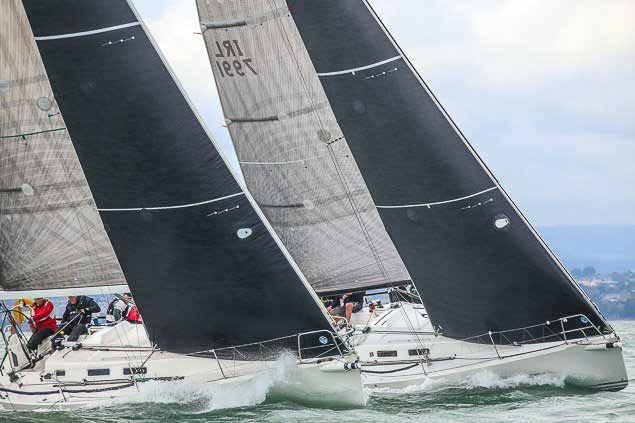 Dublin Bay J/109 racing at top one design level – the annual Nationals are one of the few events where they race as a separate class. Photo Afloat.ie/David O’Brien
Dublin Bay J/109 racing at top one design level – the annual Nationals are one of the few events where they race as a separate class. Photo Afloat.ie/David O’Brien
But nevertheless, flexibility is the keynote of the general approach. Despite the attraction of one-design or semi-one-design racing, the National Championship is one of the few events in which the class in the Greater Dublin area sails specifically as the J/109 Class.
Most of the owners are Dublin Bay Sailing Club stalwarts, and they realise that their class of 15 or so Grand Prix boats make up a significant segment of the upper part of the many and various DBSC cruiser-racer fleet.
This fleet’s turnouts on a Thursday evening are worthy of a detailed sociological study, as many of the crews include people whose only sailing is this one race on a Thursday night, and it has been that way for years. But that’s a kite for flying yet again at another time.
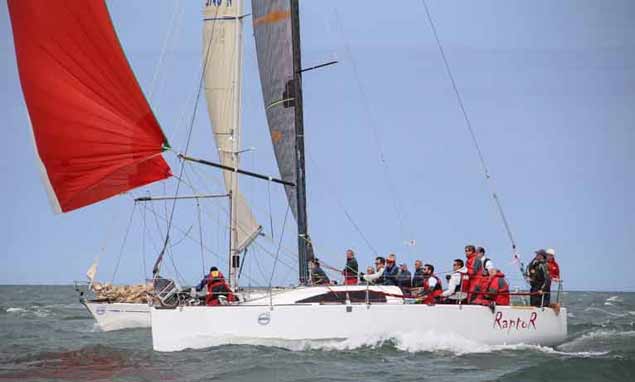 Dublin Bay cruiser-racing is one of the wonders of the Irish sailing scene – and a museum of sailing too. Raptor (Denis Hewitt & partners) may look modern, but she’s a 32ft Mark Mills design of 1996, originally built for Peter Beamish as Aztec
Dublin Bay cruiser-racing is one of the wonders of the Irish sailing scene – and a museum of sailing too. Raptor (Denis Hewitt & partners) may look modern, but she’s a 32ft Mark Mills design of 1996, originally built for Peter Beamish as Aztec
What is relevant is that the J/109 owners realize that if they hived themselves off as a separate class, it would greatly weaken the turnouts in the open divisions. So they prefer to race with their differing IRC ratings as individual boats against each other, and also against boats of other types.
It’s a flexible and mutually-beneficial arrangement which suits the reality of the times we live in. If they were racing as a white-hot and separate One Design class, they’d be under pressure week after week to have a crack crew ready and willing to go, whereas, in the more comfortable space of one of the cruiser-racer divisions, they cut you a bit of slack if frequent turnouts become too onerous.
At least, that’s the way it seems to outsiders. But certainly there’s a different mood to the class when the Irish Nationals are the weekend’s agenda, as they satisfy the need for competitive idealists who dream of a large J/109 one-design class racing week-in, week-out and continually going neck-and-neck in Dublin Bay, whereas realists appreciate that a middle course in class administration produces the most beneficial outcomes.
In achieving this, they work on the J/109’s multi-functional abilities. In a non-One Design context, they were the Boat of Choice in the Beaufort Cup series, the cornerstone of the biennial Cork Week. And the overall winner was John Maybury’s J/109 Joker 2, sailed by Commandant Barry Byrne who, back in June, had also won the Corinthian Division in the Round Ireland Race in the same boat, another feather in the J/109 cap. Then in August some of the J/109s found themselves in Calves Week in West Cork, and after the racing programme was over, owners and their families happily discovered that the J/109 really can be a very effective and comfortable cruiser.
As for the hard-raced Storm, her interests abroad went the opposite way, to the northeast. The Kelly crew have long been successful participants in the Scottish Series in late May, and in 2017 they found themselves involved in a developing Scottish initiative, the RC35 class.
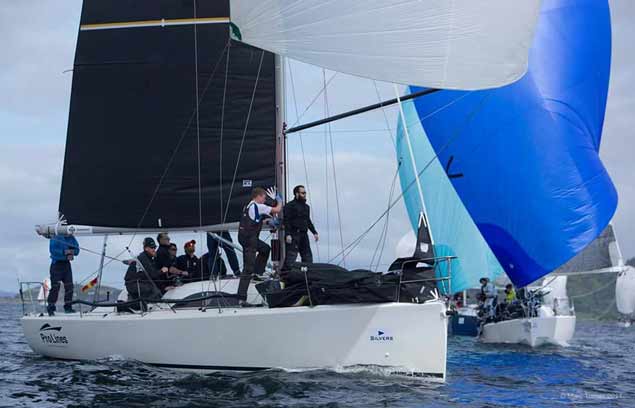 The new RC (Racing Cruiser) 35 Class began to flex its muscles at the Silvers Scottish Series 2017, and the A35 Fool’s Gold (Rob McConnell) from Dunmore East made a mark at this, the class’s national event debut, finishing second overall
The new RC (Racing Cruiser) 35 Class began to flex its muscles at the Silvers Scottish Series 2017, and the A35 Fool’s Gold (Rob McConnell) from Dunmore East made a mark at this, the class’s national event debut, finishing second overall
Sailing in Scotland doesn’t have quite the same rich vein of One Design history which continues to inform much of Dublin Bay racing, and nor does it have the same total single focus which Dun Laoghaire Harbour provides south of the River Liffey, thereby providing continuous interaction among boat-owners.
But in recent years, when the Scottish fleets have got together to race, shrewd and observant participants have noticed that the sport among boats around the 35ft level seemed to have generated its own special popularity, with a sense of community and a high level of competition to match, encouraged by the fact that all boats finished within a reasonably similar time frame.
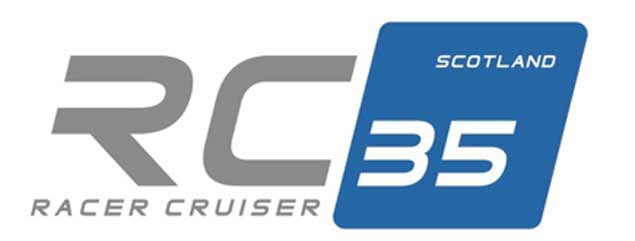 The RC 35 battle flag
The RC 35 battle flag
This was so abundantly evident at 2016’s Scottish Series that by May 2017, folk like John Stamp, Christine Murray, Kevin Aitken and Craig Latimer had hoisted the flag – with the support of Harken and other sponsors - for a new RC35 class for all boats in a tight IRC rating band between 1.015 and 1.040, but with more flexibility on overall length – your pride-and-joy can be anything from 32ft to 38ft in overall length.
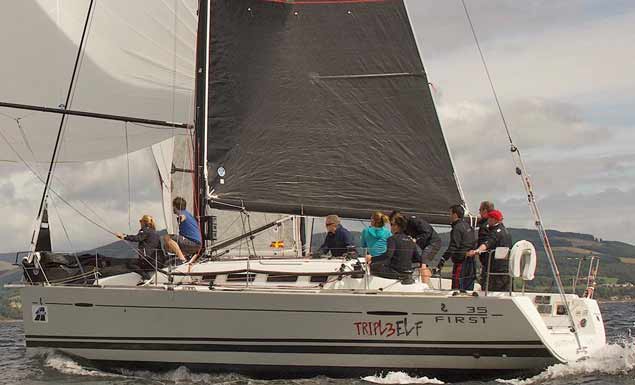 One of the keenest RC35 competitors is the First 35 Triple Elf, owned by Christine Murray who was a founder of the class
One of the keenest RC35 competitors is the First 35 Triple Elf, owned by Christine Murray who was a founder of the class
Like many successful organisational ideas, it wasn’t revolutionary – rather, it rationalised an existing situation to give it a much more attractive and user-friendly structure. Suddenly, lone owners with boats like Beneteau First 36.7s, First 35s, Archambault 35s, Corby 33s, and several Elans and X Boats, found that they were being brought in from the cold to become part of a real warm class with a nascent class association, run by owners for owners with a growing sense of camaraderie. And they’d their own developing programme, where the really keen could commit to the entire season, while others knew they’d have good racing with a welcome guaranteed even if they went to only one regatta.
The J/109s fit very neatly indeed into the lower sector of that tight RC 35 rating band, so by 2017’s Scottish Series, the Irish J/109s found that the IRC 2 Class had also become the RC35 Class, and it fitted them like a glove. Then, by the 2018 Scottish Series, IRC 2 was no more. It was now clearly named the RC35 Class. And the new setup was the best show in town, with the Irish making hay and Storm winning overall by four points from John Hall’s J/109 Something Else from the National YC.
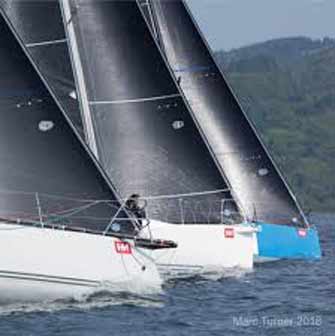 The closest of class racing for three different bow profiles, as they’re all in RC35.
The closest of class racing for three different bow profiles, as they’re all in RC35.
For Storm, it marked the conclusion of a remarkable month in Scotland which made the Kelly family the Afloat.ie “Sailors of the Month” for May 2018, as they’d been so taken with the RC35 concept from their experience in 2017 that they took part (needless to say with success) in the class in racing at the early May Bank Holiday, and Kip Regatta at mid-month before going on to Tarbert and the Scottish Series.
Then they hastened home for the new Wave Regatta at Howth and though in the J/109s they had to concede first overall to Andrew Algeo and partners in Juggerknot, Storm won the tradition Lambay Race around which the Wave Regatta is centred. For a Fingal boat, the 164-boat Lambay Race in itself is every bit as important as the Wave Regatta overall.
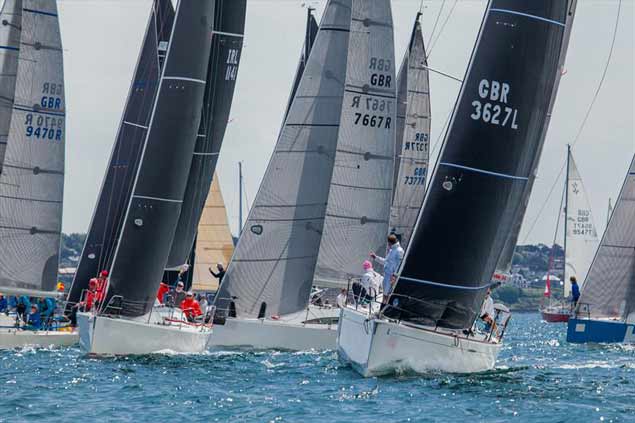 Pre-start jockeying for the RC35s at Bangor Town Regatta on Belfast Lough in July.
Pre-start jockeying for the RC35s at Bangor Town Regatta on Belfast Lough in July.
Meanwhile, up on Belfast Lough the concept of the RC 35 Class had come across the North Channel to be one of the building blocks for the multi-class Bangor Town Regatta in the extended first weekend of July, a new twist on an ancient event jointly organised by Royal Ulster YC and Ballyholme YC. In the end, the relevant class was called IRC 2, but it was the RC35s by any other name, and this time it was a Scottish boat, the Elan 380 Animal (Debbie Aitken) which won, albeit by only one point from Storm in the regatta’s hottest classes.
Back home in Howth in late July, the Kelly family’s efforts were re-directed towards helping tonner Half Tonner Harmony (Johnny Swann) prepare for the Half Ton Classics in Belgium in August, as young David Kelly – Pat’s grandson – is a member of the Harmony crew. Apart from showing the camaraderie of sailing, it was something which underlined the significant difference between Howth’s hyper-keen Half Tonners (we hear the class is soon to have an interesting new addition) and RC35s like the J/109.
For the Half Tonners are a manageable road-trailing proposition, but the J/109s and other RC 35s are too big for most owners to consider the road journey as an integral part of campaigning.
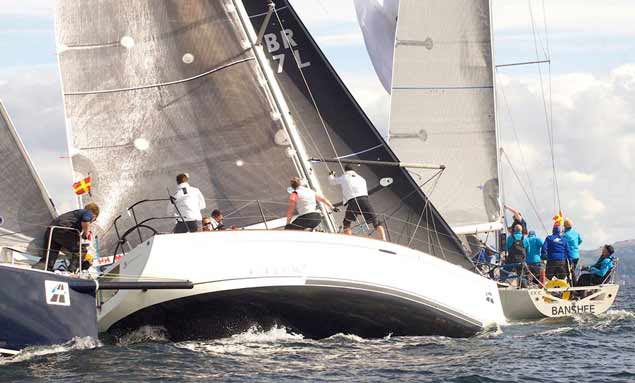 Different boat types, same class…..A typical RC35 melange at the weather mark
Different boat types, same class…..A typical RC35 melange at the weather mark
In other words, the RC35 has the potential to flourish when its various centres are within reasonable sailing distance of each other, and this is why its initial area of growth is along the Firth of Clyde with out-reach to the East Coast of Ireland and North Wales, with the different main events being given an overall structure through the season-long Celtic Cup Trophy. For 2018, this was decisively taken by Storm after she added to her earlier success in the Clyde and Belfast Lough by winning the Welsh IRC Championship off Pwllheli and Abersoch in breezy conditions in August.
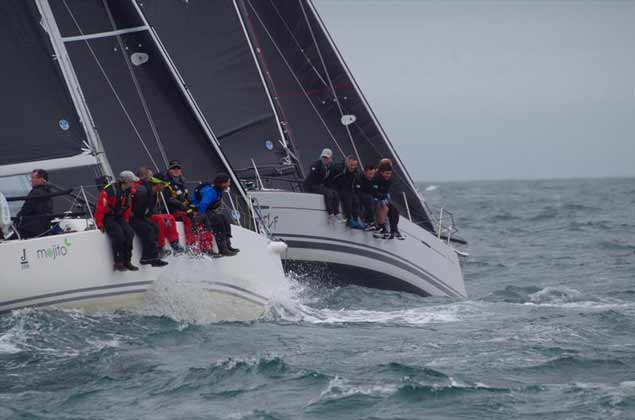 The RC35 Class gets to Wales in August 2018 – ISORA Champion 2017 (and 2018), the J/109 Mojito (Vicky Cox & Peter Dunlop), finds herself drawn into the RC35 class in close contention with Scottish visitor Triple Elf (Christine Murray).
The RC35 Class gets to Wales in August 2018 – ISORA Champion 2017 (and 2018), the J/109 Mojito (Vicky Cox & Peter Dunlop), finds herself drawn into the RC35 class in close contention with Scottish visitor Triple Elf (Christine Murray).
This weekend’s National Championship in Howth is, of course, an exclusively J/109 event, but for next year the RC35 Class are keen to make the Dun Laoghaire Regatta 2019 one of their pillar events. There were preliminary moves back in 2017, but for 2019 all the signs are that the RC35s are going to give the VDLR 2019 the full welly if all the balances between class divisions can be resolved.
Making the cut in rating bands for major cruiser-racer events is now almost a spectator sport. But there’s no doubting that the enthusiastic adherents of the diverse new RC35 class have brought a sense of cohesion, camaraderie and sheer fun in sailing to the sometimes seemingly sedate world of cruiser-racing. This is a truly grassroots movement – there’s no way it’s a stultified top-down organisation. We might say that the market has spoken, and the producers (aka Event Organisers) have to listen.
It’s all a very long way from Paul Elvstrom producing a brilliant new boat and then hoping an active class association takes shape through some sort of natural process...



























